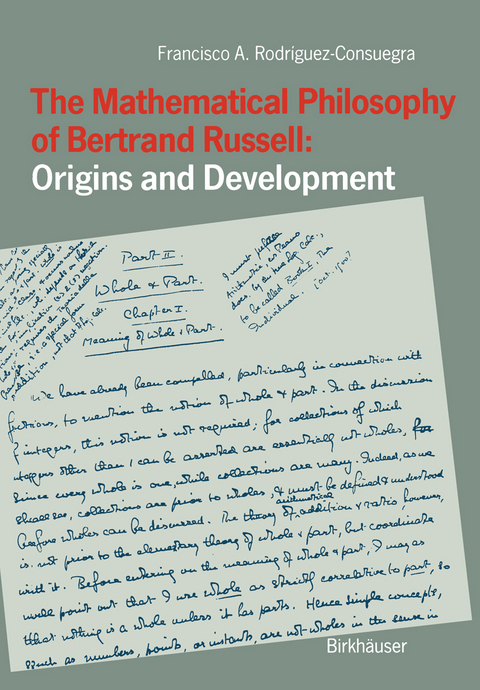
The Mathematical Philosophy of Bertrand Russell: Origins and Development
Springer Basel (Verlag)
978-3-0348-7535-6 (ISBN)
1. Methodological and logicist background.- 1.1. Boole and Peirce.- 1.2. Dedekind and Cantor.- 1.3. Couturat and Whitehead.- 1.4. Bradley and Moore.- 1.5. Foundations of geometry.- 2. The unpublished mathematical philosophy: 1898-1900.- 2.1. The genesis of the 1898-1900 manuscripts.- 2.2. Logic, mathematics and ontology.- 2.3. The evolution of the main concepts.- 2.4. Concepts, axioms, presupposition and implication.- 2.5. The contradiction and the infinite.- 2.6. Relations and the 'principle of abstraction'.- 2.7. The method of definition.- 2.8. The gradual approach to Cantor.- 3. The contribution of Peano and his school.- 3.1. Logic.- 3.2. Arithmetic.- 3.3. Geometry.- 3.4. The method.- 3.5. Peano's followers and their contributions.- 4. The principles of mathematics.- 4.1. The reaction to the Congress of 1900.- 4.2. Logic.- 4.3. Arithmetic.- 4.4. Geometry.- 4.5. What Russell learned from Peano.- 5. Philosophical and methodological problems.- 5.1. Origin and evolution of Russell's logicism.- 5.2. The principle of abstraction.- 5.3. The constructive definition.- 5.4. Relational logic and ontology.- B.1. Works by Russell.- B. 1.1. Unpublished manuscripts 224.- B. 1.2. Published or unpublished correspondence 225.- B. 1.3. Published works 225.- B.2. Works by other authors.
| Erscheint lt. Verlag | 10.5.2012 |
|---|---|
| Zusatzinfo | XIV, 236 p. |
| Verlagsort | Basel |
| Sprache | englisch |
| Maße | 170 x 244 mm |
| Gewicht | 441 g |
| Themenwelt | Geisteswissenschaften ► Philosophie ► Allgemeines / Lexika |
| Mathematik / Informatik ► Mathematik ► Allgemeines / Lexika | |
| Naturwissenschaften | |
| Schlagworte | Gottlob Frege • Hegel • History of Mathematics • Ludwig Wittgenstein • Mathematical Logic |
| ISBN-10 | 3-0348-7535-5 / 3034875355 |
| ISBN-13 | 978-3-0348-7535-6 / 9783034875356 |
| Zustand | Neuware |
| Haben Sie eine Frage zum Produkt? |
aus dem Bereich


